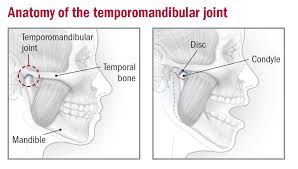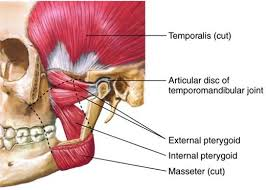The temporomandibular joint (TMJ) is your jaw joint, which connects your lower jaw to your skull. There are several facial muscles involved in chewing as well as opening and closing your mouth that attach to your lower jaw. Problems or injuries in this area can cause jaw pain, neck pain, pain that radiates into your face or ear, headaches, difficulty opening your jaw, and problems with chewing and biting. There may also be clicking or popping sounds in your jaw when you open and close your mouth or chew.

 Jaw pain and dysfunction can be caused by problems with the joint itself, or problems with the structures around the joint. The jaw is susceptible to inflammatory conditions within the joint, that are generally caused by repetitive microtrauma (jaw clenching and teeth grinding). Direct trauma such as a fall or blow to the jaw can cause structural damage or changes in the joint. As with other joints in the body, the jaw is susceptible to osteoarthritis (usually age-related degeneration) and rheumatoid arthritis (inflammatory disease). There are several muscles that attach around the jaw, and muscle spasms in this area can cause significant pain and can restrict movement of the jaw. Muscle spasms are often associated with teeth grinding, jaw clenching, stress, and prolonged dental procedures where the mouth must be held open for an extended period. Poor posture can also lead to muscle imbalances around the jaw as well as compression on the joint.
Jaw pain and dysfunction can be caused by problems with the joint itself, or problems with the structures around the joint. The jaw is susceptible to inflammatory conditions within the joint, that are generally caused by repetitive microtrauma (jaw clenching and teeth grinding). Direct trauma such as a fall or blow to the jaw can cause structural damage or changes in the joint. As with other joints in the body, the jaw is susceptible to osteoarthritis (usually age-related degeneration) and rheumatoid arthritis (inflammatory disease). There are several muscles that attach around the jaw, and muscle spasms in this area can cause significant pain and can restrict movement of the jaw. Muscle spasms are often associated with teeth grinding, jaw clenching, stress, and prolonged dental procedures where the mouth must be held open for an extended period. Poor posture can also lead to muscle imbalances around the jaw as well as compression on the joint.
 Symptoms of TMJ dysfunction include pain in the facial muscles and jaw itself (right in front of the ear), however the pain may also radiate to the neck, shoulders, and scalp. The pain may be there all the time, or may only be present with talking, chewing, or yawning. TMJ dysfunction may also cause headaches, dizziness, migraine symptoms, ringing in the ears, hearing loss nausea or vomiting. It is not uncommon to have clicking, grating, or popping sounds with TMJ dysfunction. You may also notice swelling in the face or mouth. You may notice that you favour one side of your jaw when opening the jaw, as well as locking or difficulty opening the jaw.
Symptoms of TMJ dysfunction include pain in the facial muscles and jaw itself (right in front of the ear), however the pain may also radiate to the neck, shoulders, and scalp. The pain may be there all the time, or may only be present with talking, chewing, or yawning. TMJ dysfunction may also cause headaches, dizziness, migraine symptoms, ringing in the ears, hearing loss nausea or vomiting. It is not uncommon to have clicking, grating, or popping sounds with TMJ dysfunction. You may also notice swelling in the face or mouth. You may notice that you favour one side of your jaw when opening the jaw, as well as locking or difficulty opening the jaw.
Physiotherapy treatment is highly effective in relieving and managing jaw pain/dysfunction, even when the symptoms are chronic and/or severe. Initially treatment will focus on reducing pain and inflammation. After the pain has decreased treatment will progress to restore jaw movement and alignment, through soft tissue release and joint mobility techniques. Treatment will likely also involve addressing neck pain and headaches, as well as posture correction. It may be recommended that you discuss a night splint with your dentist to prevent teeth grinding/clenching.
